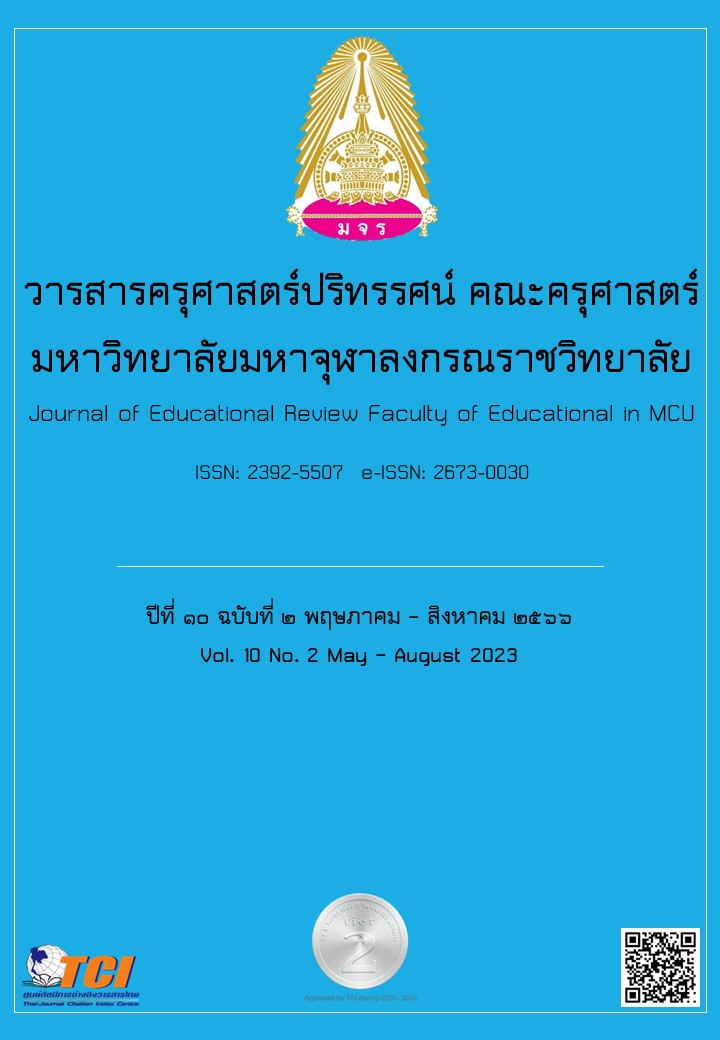THE RELATIONSHIP OF SELF-EFFICACY AND TEST ANXIETY FOR LEARNING ENGLISH AS A FOREIGN LANGUAGE WITH ENGLISH ACADEMIC ACHIEVEMENT OF GRADE 9 STUDENTS AT A PUBLIC SCHOOL IN CHONBURI, THAILAND
Main Article Content
Abstract
This study aimed to determine whether there was a significant relationship of self-efficacy and test anxiety for learning English as a foreign language with English academic achievement of Grade 9 students at a public school in Chonburi, Thailand. A convenience sample of 108 students, enrolled in three Grade 9 classes at the target school during the academic year 2021-2022, participated in this study. The Questionnaire of Self-Efficacy (QESE; Wang et al., 2013) and the Foreign Language Classroom Anxiety Scale (FLCAS; Horwitz et al., 1986) were adopted and used to measure the levels of the participants’ self-efficacy and test anxiety for learning English as a foreign language, respectively. The English as a foreign language final test scores were collected from the participants to measure their English academic achievement. From the data analysis, it was found that the overall level of self-efficacy held by Grade 9 students at the target school was slightly low, their overall level of test anxiety was moderate, and their overall level of English academic achievement was good. Moreover, participants’ English academic achievement was found to be significantly, positively and weakly correlated with their self-efficacy for learning English as a foreign language, and significantly, negatively and weakly correlated with their test anxiety for learning English as a foreign language. The combination of the participants’ self-efficacy and test anxiety for learning English as a foreign language was found to be significantly and weakly correlated with their English academic achievement. Recommendations are provided for the students, teachers, school principal and administrators, and future researchers, based on the research findings obtained from this study.
Article Details

This work is licensed under a Creative Commons Attribution-NonCommercial-NoDerivatives 4.0 International License.
ทัศนะและความคิดเห็นที่ปรากฏในบทความในวารสารฉบับนี้ถือเป็นความรับผิดชอบของผู้เขียนบทความนั้นเพียงผู้เดียว และไม่ถือเป็นทัศนะและความรับผิดชอบของกองบรรณาธิการ
กองบรรณาธิการขอสงวนสิทธิ์ในการคัดเลือกบทความลงตีพิมพ์และจะแจ้งให้เจ้าของบทความทราบหลังจากผู้ประเมินบทความตรวจอ่านบทความแล้ว
ต้นฉบับที่ได้รับการตีพิมพ์ในวารสารครุศาสตร์ปริทรรศน์ คณะครุศาสตร์ มหาวิทยาลัยมหาจุฬาลงกรณราชวิทยาลัย ถือเป็นกรรมสิทธิ์ของคณะครุศาสตร์ มหาวิทยาลัยมหาจุฬาลงกรณราชวิทยาลัย ห้ามนำข้อความทั้งหมดหรือบางส่วนไปพิมพ์ซ้ำ เว้นเสียแต่ว่าจะได้รับอนุญาตจากมหาวิทยาลัยฯ เป็นลายลักษณ์อักษร
References
Ahmad, S. & Hussain, A. (2012). Relationship of academic SE to self-regulated learning, SI, test anxiety and academic achievement. International Journal of Education. 4(1). 12-25.
Alexander, A. & González, O. R. G. (2020). A correlational study of self-efficacy and perceived parental encouragement for learning English as a foreign language with English academic achievement of Batch 5 and Batch 6 students at Level Up Academy, Loikaw Township, Kayah State, Myanmar. Scholar: Human Sciences. 12(2). 154-168.
Bandura, A. (1986). Social foundations of thought and action. Prentice-Hall.
Birjandi, P. & Alemi, M. (2010). The impact of test anxiety on test performance among Iranian EFL learners. Broad Research in Artificial Intelligence and Neuroscience. 1(4). 44-58.
Cakıcı, D. (2016). The correlation among EFL learners’ test anxiety, foreign language anxiety and language achievement. English Language Teaching. 9(8). 190-203.
Dörnyei, Z. (2005). The psychology of the language learner: Individual differences in second language acquisition. Lawrence Erlbaum.
Gardner, R. C. (2010). Motivation and second language acquisition: The socio-educational model. Peter Lang.
Horwitz, E. K. (2001). Language anxiety and achievement. Annual Review of Applied Linguistics. 21. 112-126.
Horwitz, E. K. (2010). Foreign and second language anxiety. Language Teaching. 43(2). 154-167.
Horwitz, E. K., Horwitz, M. B. & Cope, J. (1986). Foreign language classroom anxiety. The Modern Language Journal. 70(2). 125-132.
Horwitz, M. B., Horwitz, E. K. & Cope, J. (1991). Foreign language classroom anxiety. In E. K. Horwitz & D. J. Young (Eds.), Language anxiety: From theory and research to classroom implications. Prentice Hall.
Kitikanan, P. (2017). The effects of L2 experience and vowel context on the perceptual assimilation of English fricatives by L2 Thai learners. English Language Teaching. 10(12). 1-72.
Lufi, D., Okasha, S. & Cohen, A. (2004). Test anxiety and its effect on the personality of students with learning disabilities. Learning Disability Quarterly. 27(3). 176-184.
MacIntyre, P. D., & Gardner, R. C. (1994). The subtle effects of language anxiety on cognitive processing in the second language. Language Learning. 44(2). 283-305.
Mohammadyari, G. (2012). Comparative study of relationship between general perceived self-efficacy and test anxiety with academic achievement of male and female students. Procedia-Social and Behavioral Sciences. 69. 2119-2123.
Noorollahi, N. (2021). On the relationship between Iranian English language teaching students’ self-efficacy, self-esteem, and their academic achievement. Language Teaching Research Quarterly. 21. 84-96.
Pajares, F., & Graham, L. (1999). Self-efficacy, motivation constructs, and mathematics performance of entering middle school students. Contemporary Educational Psychology. 24. 124-139.
Pakampai, W. (2017). Students’ self-efficacy and English performance. Unpublished doctoral dissertation. Chulalongkorn University.
Paranuwat, J. (2011). A study of foreign language learning anxiety of the first year students at Srinakharinwirot University. Unpublished master’s thesis. Srinakharinwirot University.
Partridge, B. J. (2014). A comparative study on students' foreign language classroom anxiety through cooperative learning on Grade 10 students at Saint Joseph Bangna School, Thailand. Unpublished master’s thesis. Assumption University.
Renninger, K. A., & Hidi, S. E. (2017). The power of interest for motivation and engagement. Routledge.
Salehi, M., & Marefat, F. (2014). The effects of foreign language anxiety and test anxiety on foreign language test performance. Theory & Practice in Language Studies. 4(5). 931-940.
Schunk, D., & Pajares, F. (2007). Competence perceptions and academic functioning. In A. J. Elliot, & C. S. Dweck (Eds.), Handbook of competence and motivation. Guilford.
Wang, C., Kim, D. H., Bong, M., & Ahn, H. S. (2013). Examining measurement properties of an English self-efficacy scale for English language learners in Korea. International Journal of Educational Research. 59. 24-34.
Yusuf, M. (2011). The impact of self-efficacy, achievement motivation, and self-regulated learning strategies on students’ academic achievement. Procedia-Social and Behavioral Sciences. 15. 2623-2626.


